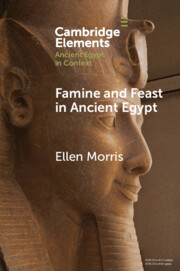This Element is about the creation and curation of social memory in pharaonic and Greco-Roman Egypt. Ancient, Classical, Medieval, and Ottoman sources attest to the horror that characterized catastrophic famines. Occurring infrequently and rarely reaching the canonical seven-years' length, famines appeared and disappeared like nightmares. Communities that remain aware of potentially recurring tragedies are often advantaged in their efforts to avert or ameliorate worst-case scenarios. For this and other reasons, pharaonic and Greco-Roman Egyptians preserved intergenerational memories of hunger and suffering. This Element begins with a consideration of the trajectories typical of severe Nilotic famines and the concept of social memory. It then argues that personal reflection and literature, prophecy, and an annual festival of remembrance functioned-at different times, and with varying degrees of success-to convince the well-fed that famines had the power to unseat established order and to render a comfortably familiar world unrecognizable.
- Summary
- Footnotes
- References

No comments:
Post a Comment